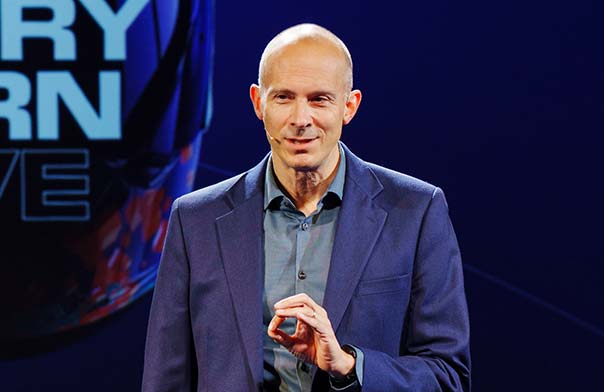 Kit Fanner OLE
Kit Fanner OLE
The BBC presenter, Oxford Fellow, data detective and million-selling author is a compelling storyteller on economics, psychology and the unexpected bits in between. Tim explores innovation and how ideas spread, what disasters teach us about ourselves, the power of price, and the use of uncertainty as a competitive weapon. He also reveals truths and myths in data – whether public information, misinformation or deliberate disinformation.
Tim Harford is a world-renowned behavioural economist, award-winning Financial Times columnist, data detective and BBC broadcaster. Described as ‘Britain’s Malcolm Gladwell’ (and as "a genius at telling stories that illuminate our world" by Gladwell himself), and by the New Statesman as ‘perhaps the best popular economics writer in the world’, Tim brings storytelling, humour, insight and intelligence to the world of data, work and statistics.
His long-running Radio 4 show and podcast More or Less looks at the truth behind the dubious statistics and manipulated figures making the news, whilst his Cautionary Tales podcast is a journey through stories of human error and its unexpected impact, with guests including Russell Tovey and Alan Cumming. He’s also presented the popular Fifty Things That Made The Modern Economy series (and wrote the accompanying books) and, in the midst of the Covid-19 pandemic, he hosted How To Vaccinate The World. On television, he wrote and fronted Channel 4’s examination of the nation’s financial challenges in Skint: The Truth Behind Britain's Broken Economy.
Although he’s a ‘serious’ economist with a career spanning Oxford, Shell and the World Bank, Tim’s FT columns dwell on the economics of daily life and offers tongue-in-cheek solutions to readers’ problems. His first book The Undercover Economist, sold almost two million copies, and built on these themes. It was likened to Freakonomics in its explanation of everything from coffee shops to organised crime to development aid. He's since gone on to be one of the foremost writers on economics.
Tim’s other titles include: The Logic of Life which applies economic theory to the world to explain how rational (or otherwise) our decisions are; Adapt: Why Success Always Starts With Failure which shows how challenges of all types need to be tackled by learning to improvise and allowing for failure. Messy: How to Be Creative and Resilient in a Tidy-Minded World, considers why tidiness, organisation and predictability aren’t always the best environments to foster innovation and achievement; and How to Make the World Add Up: Ten Rules for Thinking Differently About Numbers, equips readers with the tools to understand and question the numbers that dominate headlines, and sometimes seem to confirm our own biases.
From why we might be misunderstanding the advantages and difficulties of AI (and what the history of technology can tell us about both) to how to identify and challenge misinformation. Why it’s so hard yet so important to learn from mistakes, to how to deal with uncertainty, predict disasters and deal with flawed forecasting, Tim explores a fascinating world of behaviours, numbers and assumptions. Taking in everything from the military to game shows, aviation to ballet, he questions received wisdom, common sense, and statistical certainty. His accessible, easy style provides entertaining, thought-provoking insights relevant to every person and organisation. Tim is a member of Nuffield College, Oxford, and the only journalist to be an honorary fellow of the Royal Statistical Society. He's a two-time winner of the Bastiat Prize for economic journalism and has been named Science and Data Commentator of the Year, Economics Commentator of the Year, and has won the Society for Business Economists writing prize and the Royal Statistical Society prize for journalism.
The Undercover Economist was the first book I read when I joined JLA – since then I’ve never failed to be impressed by Tim. He makes you look at everything differently. Hearing his new speech on Big Data was a revelation: you realise the challenge is not to get the biggest data set, but the right data! He has a knack for making the seemingly impenetrable blissfully clear.
JLA Agent Jethro Fox



